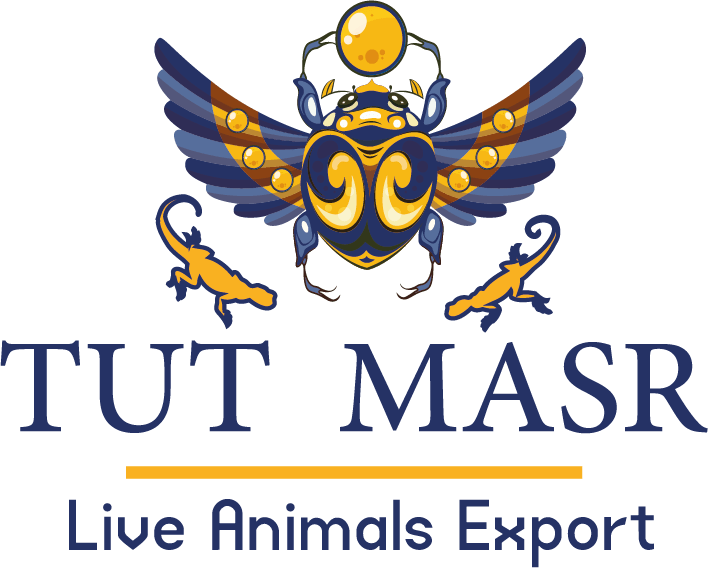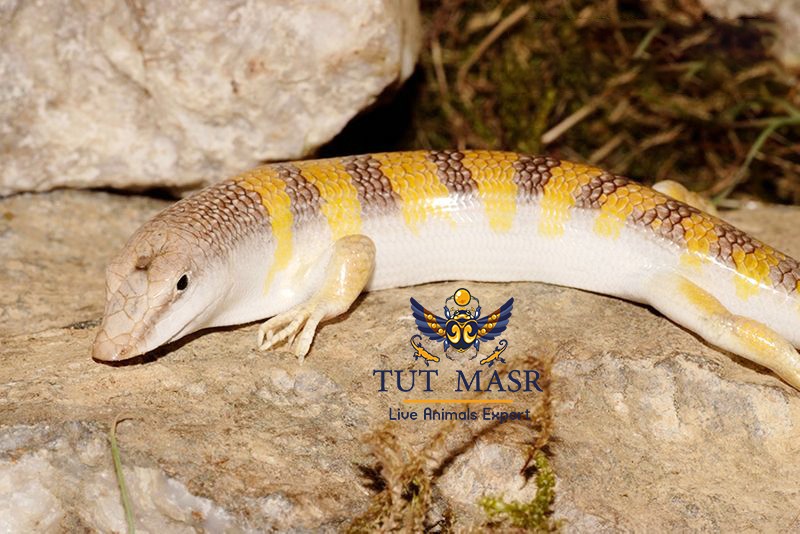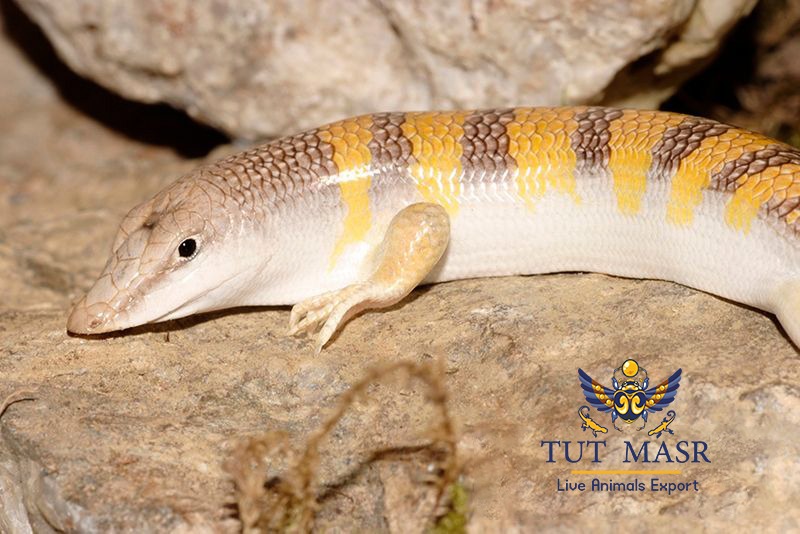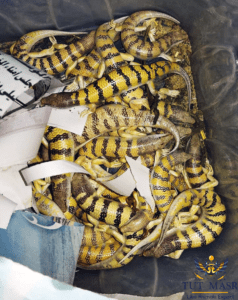Introduction : collected from Egypt and Exported by Tut Masr Company
Scincus scincus, commonly known as the Egyptian sandfish, is a unique species of lizard that is native to Egypt. These small reptiles have adapted to live in sandy desert environments, making them highly interesting and sought-after pets for reptile enthusiasts around the world. Tut Masr Company, an esteemed exporter of exotic animals, offers the opportunity to own one of these fascinating creatures.
Care Guide for Scincus scincus
If you are considering adding a Scincus scincus to your collection, it’s important to familiarize yourself with their specific care needs. Here are a few key points to keep in mind:
Habitat: Egyptian sandfish lizards require a spacious enclosure with plenty of sand substrate, as they love to burrow. The ideal setup would include temperature gradients, a basking spot, and hiding places to mimic their natural habitat.
Temperature and Lighting: Maintaining the proper temperature and providing adequate lighting are crucial for the health of your sandfish. A temperature range of 80-90 degrees Fahrenheit during the day and a drop to 70-75 degrees Fahrenheit at night is recommended. Full-spectrum lighting with UVB rays is also essential for their well-being.
Diet: Scincus scincus is an insectivorous species, primarily feeding on small insects such as crickets, mealworms, and roaches. It’s important to provide a varied diet to ensure they receive all the necessary nutrients.
Handling: While Egyptian sandfish lizards can tolerate limited handling, it’s best to minimize it. They are timid creatures that prefer to observe from a safe distance.
By following these care guidelines, you can provide a suitable environment for your Scincus scincus and enjoy the fascinating behaviors and unique characteristics of this captivating lizard. Tut Masr Company’s expertise in exporting these exquisite creatures ensures that you will receive a healthy and well-cared-for pet.
Characteristics of Scincus scincus
Physical appearance and adaptations of Scincus scincus in the Egyptian environment
Scincus scincus, commonly known as the sandfish, is a type of skink found in the desert regions of Egypt. This lizard species has a unique physical appearance and adaptations that allow it to thrive in the harsh Egyptian environment.
The sandfish typically has a slender body with smooth scales and a tail that can regenerate if lost. Its coloration ranges from light brown to yellow, which helps it blend in with the sandy surroundings. This cryptic coloration allows the sandfish to evade predators and remain hidden from potential threats.
One of the key adaptations of the sandfish is its ability to swim through sand. This reptile has specialized scales on its belly, which allow it to move effortlessly through loose sand without sinking. It propels itself by undulating its body from side to side, creating a wave-like motion that propels it forward.
Behavior and unique traits of Scincus scincus
The sandfish is primarily a burrowing lizard. It spends most of its time beneath the surface of the sand, emerging only to bask in the sun or hunt for food. This behavior helps it regulate body temperature and avoid extreme heat during the day.
One of the unique traits of the sandfish is its ability to dive into the sand when it detects a potential threat. It quickly buries itself, leaving only its eyes and nostrils exposed. This behavior provides camouflage and protection from predators.
Scincus scincus is insectivorous, feeding primarily on small insects and arthropods found in its habitat. It uses its long, sticky tongue to catch prey, and its sharp teeth to consume its food.
Overall, the sandfish is a fascinating reptile with specialized adaptations and behaviors that enable it to survive and thrive in the Egyptian desert environment.
Tut Masr Company and the Collection Process
Overview of Tut Masr Company's collection methods and ethical practices
Tut Masr Company, a reputable exporter based in Egypt, is known for its commitment to ethical practices throughout the collection process. When it comes to collecting Scincus scincus, also known as the sandfish or Egyptian sandfish, Tut Masr Company adheres to strict guidelines to ensure the well-being and conservation of this unique reptile.
The company works closely with local experts and environmental organizations to implement sustainable collection methods. This includes carefully selecting collection sites based on scientific research and taking into consideration the natural habitats of Scincus scincus. Tut Masr Company ensures that only a limited number of individuals are collected from each location, allowing for the species’ population to thrive.
Furthermore, Tut Masr Company emphasizes the importance of leaving minimal impact on the environment during the collection process. They prioritize the welfare of the sandfish and prioritize its well-being. Tut Masr Company also promotes responsible handling and transportation of the reptiles, ensuring that they are kept in suitable conditions before exportation.
Documentation and legal requirements for exporting Scincus scincus
Exporting Scincus scincus requires meticulous documentation and compliance with legal requirements. Tut Masr Company strictly adheres to these regulations to ensure the legality and sustainability of their operations.
Before exporting sandfish, Tut Masr Company obtains the necessary permits and licenses from local regulatory bodies. These documents verify that the collection and exportation of Scincus scincus are done in accordance with national and international laws protecting endangered species.
Furthermore, Tut Masr Company ensures that the sandfish are transported in compliance with international standards for animal welfare. They work closely with certified animal transport companies to provide suitable containers and proper care throughout the journey.
By adhering to these documentation and legal requirements, Tut Masr Company maintains the highest standards of transparency, legality, and conservation in the exportation of Scincus scincus.
Benefits and Challenges of Exporting Scincus scincus
Known as the common or sandfish skink, Scincus scincus is a unique reptile found in various regions, including Egypt. Tut Masr Company, a reputable exporter, recognizes the economic benefits of exporting these skinks. However, it’s crucial to consider the environmental concerns and conservation challenges associated with this practice.
Economic benefits of exporting Scincus scincus for Tut Masr Company and Egypt
Exporting Scincus scincus offers several economic advantages. Tut Masr Company is able to generate revenue by supplying these reptiles to the international market. The demand for exotic reptiles, including Scincus scincus, provides a valuable opportunity for Tut Masr Company to expand its business and contribute to the Egyptian economy. This boosts employment opportunities, supports local suppliers, and encourages foreign investments in Egypt’s reptile trade.
Environmental concerns and conservation challenges associated with exporting Scincus scincus
While exporting Scincus scincus can bring economic benefits, it’s crucial to address the environmental concerns and conservation challenges associated with this practice. The extraction of these reptiles from their natural habitat can disrupt the local ecosystem. Tut Masr Company should ensure sustainable and ethical sourcing practices, promoting responsible reptile farming, and supporting conservation initiatives to protect the wild populations.
Additionally, Tut Masr Company needs to comply with CITES (the Convention on International Trade in Endangered Species of Wild Fauna and Flora) regulations to prevent illegal wildlife trade and ensure long-term viability of Scincus scincus populations.
By balancing economic benefits with responsible practices, Tut Masr Company can play a significant role in promoting sustainability and conservation of Scincus scincus while contributing to the local economy.



